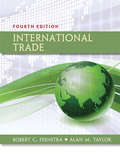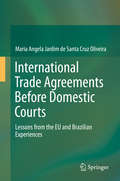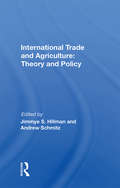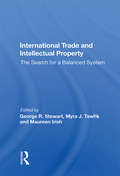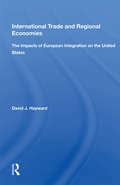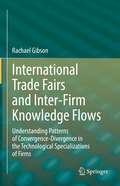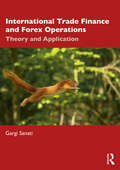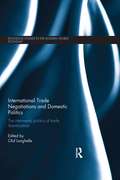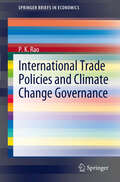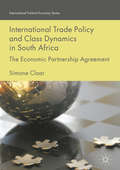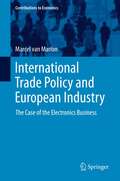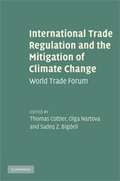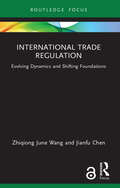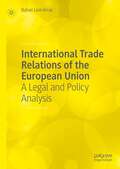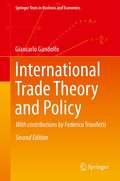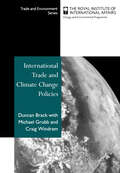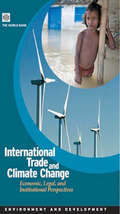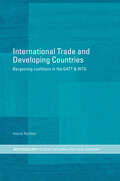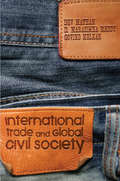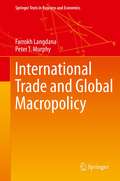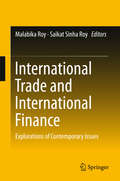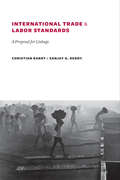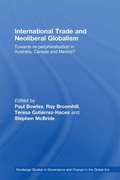- Table View
- List View
International Trade
by Robert C. Feenstra Alan M. TaylorDeveloped in the classroom by two of the most prominent researchers in the field, Feenstra and Taylor’s International Economics uses engaging applications to provide a modern view of the global economy for a modern audience. Most international economics textbooks emphasize theory and the economies of advanced countries. Feenstra and Taylor combine theoretical coverage with empirical evidence throughout, while reflecting the realities of the global economy by covering emerging markets and developing countries (India, China, Southeast Asia). The new edition has been thoroughly updated to include new data and Applications, as well as many new Headlines to reflect the rapid changes in international economics during the last three years. The 4th Edition includes the latest on opening relations with Cuba, immigration and Europe’s refugee crisis, the effect of NAFTA on wages and employment, job polarization, quicksourcing, China’s problems, and the debate in Britain about leaving the European Union.
International Trade Agreements Before Domestic Courts
by Maria Angela Jardim de Santa Cruz OliveiraThis book addresses the role of domestic courts in the enforcement of international trade agreements by examining the experiences of Brazilian and the European Union courts. This comparative study analyzes the differences, similarities and consequences of Brazilian and European courts' decisions in relation to the WTO agreements, which have "direct effect" in Latin American emerging economies, but not in the European Union or other developed countries. It observes that domestic courts' enforcement of international trade agreements has had several unintended and counterproductive consequences, which were foreseeable in light of international scholarly debate on the direct effect of WTO agreements. It draws lessons from these jurisdictions' experiences and argues that the traditional academic literature that fosters domestic courts' enforcement of international law should be reconsidered in Latin America in relation to international trade agreements. This book defends the view that, as a result of their function and objectives together with the principles of popular sovereignty and democratic self-government, international trade agreements should not be considered to be self-executing or to have direct effect. This empirical work will be valuable to anyone interested in the effects of international trade rules at the domestic level and the role of domestic judges in international law.
International Trade And Agriculture: Theory And Policy
by Andrew Schmitz Jimmye S. HillmanInternational agricultural trade now exceeds one trillion dollars. It is one of the key factors in the world economy, and the United States, like many other countries, depends on it to keep food prices reasonable, our balance of payments healthy, and the dollar from collapsing on the international money exchanges. The Symposium on International Trade and Agriculture held at Tucson, Arizona, in April 1977, covered all major topics of trade and commerce policy as they relate to agriculture. The papers presented in this book reflect the major concerns of outstanding professional economists and a great variety of agricultural research organizations.
International Trade And Intellectual Property: The Search For A Balanced System
by George R. Stewart Myra J. Tawfik Maureen IrishIn light of current negotiations concerning NAFTA and GATT, the question of intellectual property and its impact on international trade has taken on renewed urgency. The recognition and enforcement of intellectual property rights in national jurisdictions can serve to encourage international trade and economic growth or can create barriers to free and open commercial exchange. In this timely volume, Canadian, American, and Mexican scholars examine these landmark agreements and reassess the effects of intellectual property rights on international trade. Focusing on trade and intellectual property policies and practices between and within North America and Europe, they address several key issues, including "gray marketing" in North American and European trading blocs, U.S. trade policy concerning enforcement of intellectual property rights, and dramatic changes in Mexican law regarding intellectual property. The volume is essential for scholars working in intellectual property rights, international trade, and the global economy. Policymakers and anyone wishing to stay current with world trade negotiations will also find this book useful.
International Trade And Regional Economies: The Impacts Of European Integration On The United States
by David J. HaywardThis book considers the issue of regional exposure to external economic events, exploring the role of trade in the performance of American states. It focuses on the case of trade with the European Community, analyzing the potential impacts of its integration on trade with individual states. .
International Trade Disputes and EU Liability
by Anne ThiesThe European Union has become the respondent of several international trade disputes. This book examines the right to compensation for damage resulting from retaliatory measures imposed under the system of the World Trade Organization in disputes triggered by the EU. Anne Thies evaluates the implications of the EU's membership in the WTO for its domestic system of rights and judicial protection. Emphasising the necessity to maintain EU standards of protection independently of the external dimension of EU action, the book offers suggestions on how the current gap of protection could be filled while upholding the scope of manoeuvre of the EU institutions on the international plane. Moreover, it places the issue in its broader context of the relationship between international and EU law on the one hand, and the discretion of the EU as a global actor and standards of individual rights protection under EU law on the other.
International Trade Fairs and Inter-Firm Knowledge Flows: Understanding Patterns of Convergence-Divergence in the Technological Specializations of Firms
by Rachael GibsonAgainst a backdrop of economic uncertainty caused by a shift toward protectionism and the COVID-19 pandemic among other issues, this book suggests that international trade fairs (ITFs) represent a vital source of economic dynamism that can support national and regional economies by creating opportunities for firms to access new markets, network with key actors in their industry or value chain, and tap into valuable external knowledge flows regarding new technologies and innovations. Author Rachael Gibson argues that ITFs have become crucial nodes in the global political economy, driving global economic dynamics and mediating differences between capitalist economies regarding their technological and institutional practices and conditions. In this way, ITFs represent a decisive mechanism by which distinct national patterns of technological specialization may converge or diverge.Trade fairs represent important platforms for networking, interactive learning, and knowledge exchange because they foster intense interactions among actors despite spatial boundaries. ITFs also tend to be organized according to a specific technological or industry focus, which means that they can facilitate interactions between firms from different capitalist varieties. Through the diffusion of state-of-the-art knowledge, ITFs may, thus, serve as drivers of economic globalization, challenging the continuation of distinct capitalist varieties by enabling cross-system convergence regarding the technological specializations of firms. Yet, it is clear that countries have retained competitive advantages in specific industries and that full convergence has not taken place. This book explores this puzzle.
International Trade Finance and Forex Operations: Theory and Application
by Gargi SanatiThis book bridges the existing gap between the theory and practices related to international finance. It discusses banking theories and operational procedures relating to the methods of payment with special reference to Letters of credit (LCs), like revolving LCs, back-to-back LCs, transferable LCs, and standby LCs, with specific applications of documentary discrepancies. Moreover, this book discusses merchanting trade, buyers’ credit and supplier’s credit, and bank guarantees with many practical caselets, linked to the applications of the International Chamber of Commerce (ICC) and other regulatory rules. It also examines the various roles of banks in financing international trade which are extensively discussed through several cases.This volume: Explains in-depth the intricacies and discrepancies relating to the documentation involved in international trade Presents in detail the various steps of executing an export or import deal, right from signing of the contract, managing pre-shipment credit, and booking a forward contract to hedge the exchange rate risk till the closing of the deal Gives a comprehensive account of all trade finance products with processes and procedures, rules, and regulations, and risks and mitigates Discusses the application of ICC rules through detailed case-lets, which helps an exporter take necessary actions when the payment is denied by a party overseas, or how an importer can simply deny the payment if there is documentary noncompliance Scrutinises different types of forex transactions, the regulatory framework within which they take place, and the associated risks and solutions Attempts to resolve the existing disparity in the understanding and interpretation of regulatory guidelines and the practices adopted by banks and corporate houses in implementing them. Accessibly written, this book will be useful to students, researchers, and teachers from the fields of management, business studies, international trade and treasury operations, finance, international banking, trade and commerce, and economics. This will also be an invaluable companion to the professionals working in export–import businesses, foreign exchange businesses, treasury front-office and back-office operations, bureaucrats, and public policymakers.
International Trade Negotiations and Domestic Politics: The Intermestic Politics of Trade Liberalization (Routledge Studies in the Modern World Economy #121)
by Oluf LanghelleIn spite of many years of negotiation on trade liberalization, progress seems to have stalled. This book explores why resistance to further market liberalization seems so strong, given that the benefits are seen to outweigh the costs. This volume argues that in order to understand the slow progress of World Trade Organization negotiations, we need to take into consideration the ‘intermestic’ character of trade politics, that is, the way in which international and domestic aspects of politics and policies have been woven together and become inextricably related to each other. This is a general trend in our globalizing world, and one that is most pronounced in the case of trade politics and policy. International Trade Negotiations and Domestic Politics therefore presents an in-depth analysis of institutions, ideas, interests and actors in the interplay between international trade negotiations and national negotiating positions. At the international level the authors focus on the multilateral negotiations within the World Trade Organization, together with the plurilateral and bilateral negotiations on free trade agreements. At the regional and domestic level they analyze the trade politics and policies of two established powers, the European Union and the USA; two rising powers, China and India; and a small industrialized country with an open economy, Norway.
International Trade Policies
by International Monatry FundA report from the International Monetary Fund.
International Trade Policies and Climate Change Governance
by P. K. RaoThis work offers a synthesis of the current approaches toward an integration of international trade and climate change, with a view to fostering potential improvements in policies and institutions affecting these. A number of pragmatic measures are proposed with reference to the WTO and the United Nations Framework Convention on Climate Change (UNFCCC) regimes, which are expected to contribute toward enhanced climate change governance, as well as promoting international trade.
International Trade Policy and Class Dynamics in South Africa
by Simone ClaarThis book provides an innovative perspective on class dynamics in South Africa, focusing specifically on how different interests have shaped economic and trade policy. As an emerging market, South African political and economic actions are subject to the attention of international trade policy. Claar provides an in-depth class analysis of the contradictory negotiation processes that occurred between South Africa and the European Union on Economic-Partnership Agreements (EPA), examining the divergent roles played by the political and economic elite, and the working class. The author considers their relationships with the new global trade agenda, as well as their differing standpoints on the EPA.
International Trade Policy and European Industry: The Case of the Electronics Business
by Marcel Van MarionTrade policy has played a vital role in the decline of European electronics business. The events that resulted in the disappearance of the European television industry, of a European and Japanese video recorder format and of other European consumer electronics are directly related to market structures in exporting countries and business practices. In this book, factual business data shows and economic models explain how restrictive trade practices result in elimination of efficient competitors in export markets. It deals with the memorable case how a videocassette recorder format was established by dumping and how politics enabled it. An innovative tariff increase for CD players was invalidated by heavy dumping, causing closure of production in Europe. European CTV industry succumbed under permanent dumping and a series of biases - as the interest of a state-owned company - and serious errors making trade instruments void and rules irreconcilable with international agreements. Practical and theoretical examples and explanations, some in detail, of trade rules are provided. The book sketches events - carelessness, prejudice or special interests, arbitrary and false application of trade instruments and fraud - resulting in disappearance of various European electronics business segments.
International Trade Regulation and the Mitigation of Climate Change
by Thomas Cottier Olga Nartova Sadeq Z. BigdeliWhat can trade regulation contribute towards ameliorating the GHG emissions and reducing their concentrations in the atmosphere? This collection of essays analyses options for climate-change mitigation through the lens of the trade lawyer. By examining international law, and in particular the relevant WTO agreements, the authors address the areas of potential conflict between international trade law and international law on climate mitigation and, where possible, suggest ways to strengthen mutual supportiveness between the two regimes. They do so taking into account the drivers of human-induced climate change in energy markets and of consumption.
International Trade Regulation: Evolving Dynamics and Shifting Foundations (Routledge Research in International Economic Law)
by Zhiqiong June Wang Jianfu ChenThe international trade regulatory system is a dynamic system that has been evolving throughout its history. Tension and conflict are part of the system. While calls for the abolition of the principal trade regulation authority, the WTO, have failed to understand this nature of the system, proponents for reforms have so far not paid sufficient attention to the evolving nature of tension and conflict. This book examines the evolving dynamics in international trade regulation from the conclusion of GATT in 1947 to the current crisis facing the WTO, from a perspective of emerging powers of developing countries with a focus of China as the latest force that demands reforms of the international trade regulatory regime. There is an extensive body of scholarship on ideological struggles, the rise of developing countries, geopolitical contest, the emerging powers (especially China), the use, misuse or abuse of trading rules and so on. There is, however, a lack of a single concise research book that synthesises these underlying causes and factors into a coherent and precise analytical theme. This book attempts to fill this research gap by building upon the existing scholarship and placing the various tensions and conflicts in a perspective that treats them as dynamic factors that have propelled a continuing process of evolution of the international trade regulation. The book will interest those researching on international trade regulation as well as development studies.
International Trade Relations of the European Union: A Legal and Policy Analysis
by Rafael Leal-ArcasThis book examines the need for greater legal coherence within international trade negotiations between the European Union (EU) and external trade relations. An introspective analysis of EU trade law and policy is presented that highlights the complex issue of EU unity. A particular focus is given to the Doha Round and the General Agreement on Trade in Services, with empirical analysis placing the negotiations not just within the context of international trade law, but also within broader social and political contexts. This book aims to provide an interdisciplinary understanding of the EU’s international trade negotiations. It will be relevant to researchers and policy-makers interested in international trade and EU law.
International Trade Theory and Policy
by Federico Trionfetti Giancarlo GandolfoIn the present text the author deals with both conventional and new approaches to trade theory and policy, treating all important research topics in international economics and clarifying their mathematical intricacies. The textbook is intended for undergraduates, graduates and researchers alike. It addresses undergraduate students with extremely clear language and illustrations, making even the most complex trade models accessible. In the appendices, graduate students and researchers will find self-contained treatments in mathematical terms. The new edition has been thoroughly revised and updated to reflect the latest research on international trade.
International Trade and Climate Change Policies
by Duncan Brack with Michael Grubb and Craig WindramFocusing on the likely impacts on trade of the UN Framework Convention on Climate Change and the Kyoto Protocol, this book examines the actual and potential conflicts between whether liberalization of trade undermines the efforts of industrialised countries to mitigate climate change. It will be essential reading for environmental economists and those engaged in international environmental relations and policy.
International Trade and Climate Change: Economic, Legal, and Institutional Perspectives
by World BankClimate change remains a global challenge requiring international collaborative action. Another area where countries have successfully committed to a long-term multilateral resolution is the liberalization of international trade. Integration into the world economy has proven a powerful means for countries to promote economic growth, development, and poverty reduction. The broad objectives of the betterment of current and future human welfare are shared by both global trade and climate regimes. Yet both climate and trade agendas have evolved largely independently through the years, despite their mutually supporting objectives. Since global emission goals and global trade objectives are shared policy objectives of most countries, and nearly all of the World Bank's clients, it makes sense to consider the two sets of objectives together. This book is one of the first comprehensive attempts to look at the synergies between climate change and trade objectives from economic, legal, and institutional perspectives. It addresses an important policy question - how changes in trade policies and international cooperation on trade policies can help address global environmental spillovers, especially GHG emissions, and what the (potential) effects of (national) environmental policies that are aimed at global environmental problems might be for trade and investment. It explores opportunities for aligning development and energy policies in such a way that they could stimulate production, trade, and investment in cleaner technology options.
International Trade and Developing Countries: Bargaining Coalitions in GATT and WTO (RIPE Series in Global Political Economy)
by Amrita NarlikarA keen analysis of how and why countries bargain together in groups in world affairs, and why such coalitions are crucial to individual developing nations. It also reveals the effects these negotiating blocs are having on world affairs. Successful coalition building has proven to be a difficult and expensive process. Allies are often not obvious and need to be carefully identified. Large numbers do not necessarily entail a proportionate increase in influence. And the weak have the choice of teaming up against or jumping on the bandwagon with the strong. Even after it has been organised, collective action entails costs of many kinds. This book investigates the relevance and workability of coalitions as instruments of bargaining power for the weak. More specifically, this analyzes the coalition strategies of developing countries at the inter-state level, particularly in the context of international trade. Given the nature of this enquiry, this new study uses theoretical and empirical methods to complement each other. The theoretical approach draws from a plethora of writings: formal theories of clubs and coalitions, theories of domestic political economy and theories of international relations. The empirical analysis of comparable coalitions becomes necessary to assist in this theorising, so the greater part of the book focuses mainly (though not exclusively) on coalitions involving developing countries on the issue-area of trade in services. Through the case-studies of the Uruguay Round and an analytical overview of more recent coalitions, this text fills an important gap in the literature of international political economy and international relations where most GATT/WTO-based coalitions have eluded record. This book will be of great interest to all students of international relations, politics and globalization.
International Trade and Global Civil Society
by Dev Nathan D Narasimha Reddy Govind KelkarThis study challenges the dominant tendency of civil society to negate international trade as such. The authors argue that it is necessary to frame differentiated trade rules based on levels of economic development, and also to shift from subsidies to shore up uncompetitive livelihoods to productivity-enhancing investments.Most importantly, the book ends with a case for trade unions, women's organizations and other civil society organizations to imagine and create themselves as being global -- in order to take up the challenge of strengthening global countervailing power to capital.
International Trade and Global Macropolicy
by Farrokh Langdana Peter T. MurphyIn the curricula of highly ranked MBA programs, two areas of discussion are conspicuously absent: International Trade, and Global Macroeconomic Policy. In this post-financial crisis environment, as the US and other advanced economies continue to experience sluggish growth, persistently high unemployment, and political agitation for increasingly protectionist policies, discussions pertaining to trade, currencies, and international capital flows are often fraught with emotion, tension, and hysteria. This book cuts through the emotions and superficial "solutions" and provides the reader with a thorough understanding of the hard-hitting theoretical models that drive the global flow of goods, services, and capital in the real world. A key feature of this volume is the presentation of the theoretical models, and the discussion of their implications in the context of real-world applications. This text is uniquely designed for current and future business leaders who are, or will be, engaged in the global economy. Armed with an understanding of the theoretical underpinnings driving goods, capital and ideas across national boundaries, readers will learn to anticipate the effects of trade and macroeconomic policy changes, and will have the tools to make sound, informed decisions for themselves and their global organizations.
International Trade and International Finance
by Malabika Roy Saikat Sinha RoyThis book brings together a collection of papers on international trade and international finance, instead of treating the two as disjoint fields of study. The volume, while focusing on the recent developments and frontiers of research in international trade and international finance, also emphasizes the inherent integrated nature of the two subjects; some of the papers are overlapping across the two areas. A unique feature of the proposed volume is that it unravels some new issues in addition to re-examining certain old issues in a new perspective and thus covers wide ranging issues with an emphasis on policy. The book covers issues mostly relating to emerging market economies, which has increasingly assumed importance in the context of globalization. The book contains some survey papers covering the frontiers of current knowledge on important themes like recent developments in trade theory and empirics, foreign exchange market, institutions in trade and finance, interrelation and interaction between international trade and international finance. The papers, fruit of rigorous and original research, are written by internationally and nationally reputed authors along with promising young researchers on the subjects. The book substantially contributes to the growing literature on issues relating to trade and international finance in emerging market economies and extends the frontiers of knowledge. The book is expected to have the widest possible readership comprising of advanced undergraduate and graduate students as well as senior researchers working in international trade and international finance.
International Trade and Labor Standards: A Proposal for Linkage
by Christian Barry Sanjay ReddyProgressive governments in poor countries fear that if they undertake measures to enhance real wages and working conditions, rising labor costs would cause wealthier countries to import from and invest elsewhere. Yet if the world trading system were designed to facilitate or even reward measures to promote labor standards, poor countries could undertake them without fear.In this book, Christian Barry and Sanjay G. Reddy propose ways in which the international trading system can support poor countries in promoting the well-being of their peoples. Reforms to the trading system can lessen the collective-action problem among poor countries, increasing their freedom to pursue policy that better serves the interests of their people. Incorporating the right kind of linkage between trading opportunities and the promotion of labor standards could empower countries, allowing them greater effective sovereignty and enabling them to improve the circumstances of the less advantaged. Barry and Reddy demonstrate how linkage can be made acceptable to all players, and they carefully defend these ideas against those who might initially disagree. Their volume is accessible to general readers but draws on sophisticated economic and philosophical arguments and includes responses from leading labor activists, economists, and philosophers, including Kyle Bagwell, Robert Goodin, Rohini Hensman, and Roberto Mangabeira Unger.
International Trade and Neoliberal Globalism: Towards Re-peripheralisation in Australia, Canada and Mexico? (Routledge Studies in Governance and Change in the Global Era)
by Paul Bowles Ray Broomhill Teresa Gutiérrez-Haces Stephen McBridInternational trade must be analysed within the historical context within which it occurs. Behind the statistics on trade flows lie power structures, class interests and international hierarchies. These change over time and how countries respond to them has critical implications for their citizen’s well-being. In this book, the history of trade in Australia, Canada and Mexico is analysed. Trade agreements are analysed in detail to explore the new forms that dependence and subordination have taken. Arguing that the free trade agreements are significantly biased in favour of the United States, the contributors analyse how each of the three countries are being subject to specific forms of re-peripheralisation and examine possible alternatives for a progressive future based on an integration in the global economy which enhances, rather than limits, democracy and social justice. By providing an historical and critical account of trade policy in the three countries, the book provides a welcome antidote to the ahistorical accounts of free trade supporters.
